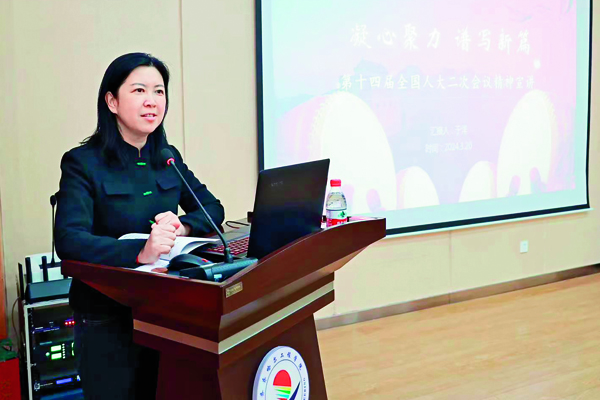NPC deputy calls for improving long-term care insurance system

Yu Yang, deputy director of the nursing department at the First Affiliated Hospital of Qiqihar Medical University in Qiqihar city in Northeast China's Heilongjiang province and a deputy to the National People's Congress, gives a presentation on the guiding principles of the two sessions. [Photo provided to npc.gov.cn]
Yu Yang, deputy director of the nursing department at the First Affiliated Hospital of Qiqihar Medical University in Qiqihar city, Northeast China's Heilongjiang province, is steadfast in her career with a motto of "protecting people's health and valuing people's life above all."
Since donning her white coat and nurse's cap in June 2002, she has been a "guardian angel" in the healthcare realm.
Working tirelessly in the neurosurgery department, Yu faced the challenges of caring for patients with severe brain trauma and hemorrhages, for whom timely observation is critical in preventing life-threatening complications. Her commitment and diligence is evident as she responds promptly to patients' needs, often reaching their bedside before the call bell ceases ringing.
Recognized for her outstanding work, Yu was appointed as the head nurse of the fourth ward of the neurology department in July 2015. Leading her nursing team, she collaborated closely with medical professionals to establish a green passage for the emergency treatment of thrombolysis and provide comprehensive care for stroke patients, significantly reducing mortality and disability rates.
In recent years, Yu, also a deputy to the National People's Congress (NPC), has been committed to promoting the establishment of a long-term care insurance system, emphasizing its importance as a "safety net" for people with disabilities.
Drawing from personal experiences, she highlighted the necessity of such a system by recounting the story of a middle-aged man with congenital dementia who required constant care in the absence of adequate support. Yu said that a comprehensive long-term care insurance system, as a supplement to social security, would serve as a crucial social safety net to address the challenges posed by an aging population and to ensure care for the disabled.
Her efforts bore fruit when her suggestions were reflected in this year's Government Work Report, which highlights the necessity to promote the establishment of a long-term care insurance system.
Noting the removal of the term "pilot" from this year's Government Work Report in comparison to those of previous years, Yu said that it represents a significant step towards the comprehensive implementation of the system.
While progress has been made with the long-term care insurance system in pilot cities and regions, challenges remain, including a shortage of nursing staff, low professional standards, and the slow development of care facilities, she added.
Given the situation, Yu stressed the need to adopt a systematic approach to training and developing professionals to enhance the quality of care services.
At this year's NPC session, Yu submitted the suggestion to promote the vocational development and training of long-term care professionals, advocating for the establishment of specialized training centers and collaboration between educational institutions and care facilities.
She also emphasized the importance of certification as well as standardized and targeted training to elevate the overall quality of care services and ensure that caregivers are well-equipped to provide specialized care.
As an NPC deputy, Yu remains committed to advocating for the interests of the people. She said that she will continue to conduct in-depth research to provide practical recommendations.
- China's top legislator holds talks with speaker of Zambia's National Assembly
- China's top legislator meets Finnish president
- Lawmakers to meet early next month to deliberate draft laws, reports
- Senior Chinese legislator meets Ethiopian guests in Beijing
- Senior legislator solicits opinions on revisions to education laws



